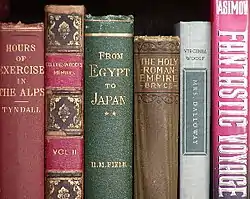The Hand of Ethelberta
The Hand of Ethelberta: A Comedy in Chapters is a novel by Thomas Hardy, published in 1876. It was written, in serial form, for the Cornhill Magazine, which was edited by Leslie Stephen, a friend and mentor of Hardy's. Unlike the majority of Hardy's fiction, the novel is a comedy, with both humour and a happy ending for the major characters and no suicides or tragic deaths. The late nineteenth century novelist George Gissing, who knew Hardy, considered it 'surely old Hardy's poorest book'.[1]

Plot summary
At the beginning of the book, it is told that Ethelberta was raised in humble circumstances but, through her work as a governess, married well at the age of eighteen. Her husband died two weeks after the wedding and, now twenty-one, Ethelberta lives with her mother-in-law, Lady Petherwin. In the three years that have elapsed since the deaths of both her husband and father-in-law, Ethelberta has been treated to foreign travel and further privilege by her benefactress, but restricted from seeing her poor family.
The events of the story concern Ethelberta's career as a famous poet and storyteller as she struggles to support her family and conceal her secret—that her father is a butler. Beautiful, clever, and rational, she easily attracts four very persistent suitors (Mr. Christopher Julian (a struggling musician), Mr. Neigh and Mr. Ladywell, both gentlemen and friends, and Lord Mountclere, a 65-year old aristocrat with a dubious past), but is reluctant to give her much-coveted hand. She finally elects for Lord Mountclere, after he comes to know the secret of her low birth and family, and she comes to dominate him, running his estate and saving him from bankruptcy. Her unrequited suitor Christopher Julian realises he would never have been happy with her had she married him, and settles for her younger sister Picotee who had been in love with him for years.
Illustrations by George du Maurier
 "She Stopped Like a Clock"
"She Stopped Like a Clock" "Round Her, Leaning Against Branches, or Prostrate on the Ground, Were Two or Three Individuals"
"Round Her, Leaning Against Branches, or Prostrate on the Ground, Were Two or Three Individuals" "Goodness! How Quick You Were"
"Goodness! How Quick You Were" "It Was A Tender Time"
"It Was A Tender Time" "The Harefield Estate"
"The Harefield Estate" "So Ethelberta Went"
"So Ethelberta Went" "Can You Tell Us the Way, Sir, to the Hotel Bold Soldier?"
"Can You Tell Us the Way, Sir, to the Hotel Bold Soldier?" "'In the Writing of the Composer', Observed Lord Mountclere with Interest"
"'In the Writing of the Composer', Observed Lord Mountclere with Interest" "All Before Them Was A Sheet of Whiteness"
"All Before Them Was A Sheet of Whiteness" "She Lessened in His Gaze, and Was Soon Out of Sight"
"She Lessened in His Gaze, and Was Soon Out of Sight"
See also
 novels portal
novels portal
References
- Coustillas, Pierre, ed. London and the Life of Literature in Late Victorian England: the Diary of George Gissing, Novelist. Brighton: Harvester Press, 1978, p. 236
External links
- The Hand of Ethelberta at Project Gutenberg
 The Hand of Ethelberta public domain audiobook at LibriVox
The Hand of Ethelberta public domain audiobook at LibriVox